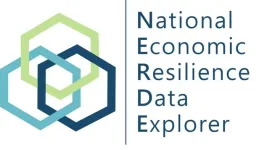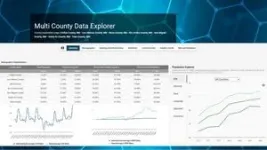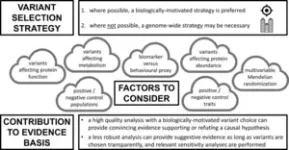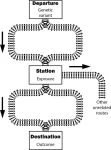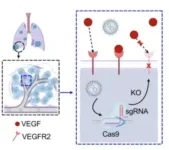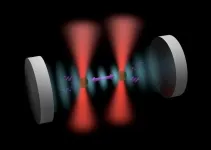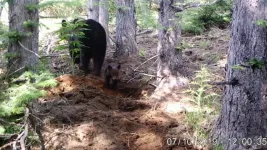(Press-News.org) Community leaders and administrators now have a more powerful tool for understanding their communities’ economic strengths and vulnerabilities, thanks to the newly enhanced and cleverly monikered National Economic Resilience Data Explorer (NERDE). The online data portal’s enhanced second edition makes it easier for users to create economic development plans, improve resilience and apply for economic assistance and grants.
NERDE first launched as a partnership between the U.S. Department of Energy’s (DOE) Argonne National Laboratory and the Department of Commerce’s Economic Development Administration (EDA) in 2022. Since then, both the number of users and scope of its resources have grown tremendously.
“We spent the past year and a half talking to as many user groups as we could to learn exactly how people are using the portal, and what data was important to them,” explained Iain Reed Hyde, director of the National Economic Research and Resilience Center at Argonne. “We learned that NERDE has been highly useful for grant applications, comprehensive economic development strategies and market research. It has helped users to better understand their strengths. And what challenges to focus on.”
NERDE data includes statistics regarding local economic distress, employment and gross domestic product, local industry clusters, climate risk and innovation. The platform provides this information for more than 3,000 counties and for every economic development district in the United States.
“Since its launch, NERDE has proved itself to be a valuable resource for local leaders and development professionals pursuing evidence-based, data-driven economic development,” said Alejandra Y. Castillo, assistant secretary of commerce for economic development. “Its new, user-friendly interface and additional data will only increase its value to users of all levels as they work to improve the economic resilience of their communities.”
Many of NERDE’s new features aim to improve its user experience. Specifically, the new release presents data in ways that are more consistent with administrators’ and developers’ anticipated use. For example, the upgrade makes it easier for users to compare their community’s strengths and weaknesses to those of neighboring communities. This was a need often cited by user groups, and it provides users with “tool tips” that help explain why various metrics are important to resilience. Additionally, users are able to better understand how data can be used in analysis, planning and grant applications.
“We really wanted to increase NERDE’s value for users in the beginner and medium experience categories,” said Alison Turner, a senior economic development researcher at Argonne. “So, this new release focuses on using narrative elements to deliver more context around the data — as opposed to simply delivering the data itself.”
The upgrade also includes a redesigned local “snapshot” called “My Community Report.” This tool provides the types of metrics in which a beginner or occasional user may have more interest. Metrics are chosen based on the user’s geographic location (e.g., rural vs. urban). Users can explore data at the neighborhood level or select multiple counties simultaneously to create a custom development district to analyze.
In addition to more capabilities, the new edition of NERDE provides more types of data. Users can now access information from Argonne’s Economic Development Capacity Index (EDCI) alongside other NERDE data. They can view metrics on patent claims and Small Business Innovation Research grants. These stats provide insights into local innovation and small business development activity. Users can also access data and maps regarding potential risks to communities posed by climate change. And they can analyze U.S. Census trade data at the state level. More advanced users will be able to access all of this data through a redesigned application programming interface. This creates a “one-stop shop” for community-level economic data.
In fact, U.S. Census played a significant role in NERDE’s upgrade. The NERDE development team participated in a 12-week technology development “sprint” that focused on building data platforms for public officials. The sprint was part of the U.S Census Bureau’s Open Innovation Labs’ The Opportunity Project (TOP).
“The TOP sprint helped us get insights from multiple user groups working within local economic development and local policymaking circles,” said Carmella Burdi, geographic information systems and data analytics group leader at Argonne. “These insights helped us home in on what enhancements would help the widest variety of users improve their communities’ economic resilience more easily and effectively.”
All NERDE’s new features aim to build on the tool’s growing success as an indispensable resilience building tool. Please join the NERDE development team for a comprehensive training webinar on Tuesday, March 5 at 12 p.m. CT, or on Monday, March 18 at 2 p.m. CT. Both webinars contain the same information so choose the time and date that works best for you. Register here to receive a meeting link.
Please visit this link to learn more about what NERDE and other National Economic Research and Resilience Center tools can do for your community’s economic growth.
Argonne National Laboratory seeks solutions to pressing national problems in science and technology. The nation’s first national laboratory, Argonne conducts leading-edge basic and applied scientific research in virtually every scientific discipline. Argonne researchers work closely with researchers from hundreds of companies, universities, and federal, state and municipal agencies to help them solve their specific problems, advance America’s scientific leadership and prepare the nation for a better future. With employees from more than 60 nations, Argonne is managed by UChicago Argonne, LLC for the U.S. Department of Energy’s Office of Science.
The U.S. Department of Energy’s Office of Science is the single largest supporter of basic research in the physical sciences in the United States and is working to address some of the most pressing challenges of our time. For more information, visit https://energy.gov/science.
END
Argonne upgrade lets data portal users “get NERDE” about economic resilience
Argonne’s updated online data explorer provides community leaders and administrators with more accessible, easier-to-use economic development data
2024-03-01
ELSE PRESS RELEASES FROM THIS DATE:
Latest booster reduces adults’ risk of moderate or severe COVID by more than half
2024-03-01
The most recent COVID-19 booster shot reduces adults’ risk of moderate or severe COVID by more than half, according to a new nationwide data study from September 2023 through January 2024, a period of JN.1 variant dominance.
The new study is one of the first to evaluate protection provided by the updated shot against COVID-19-associated emergency department and urgent care visits (markers for moderate disease) and against hospitalizations (a marker for severe disease), in individuals 18 and older, due to JN.1, the most ...
Making sense of Mendelian randomization
2024-03-01
Mendelian randomization, a powerful tool in medical research, helps us understand whether certain factors truly cause disease. This technique uses genetic variations as "natural experiments" to reveal cause-and-effect relationships. However, choosing the proper genetic variations is crucial for accurate results.
Think of a train network where the genetic variation is the starting point, the exposure is a station, and the disease is the destination. The train must pass through the exposure station en route to the disease. This represents the critical assumption of Mendelian randomization: ...
Precision pulmonary medicine: Penn engineers target lung disease with lipid nanoparticles
2024-03-01
Penn Engineers have developed a new means of targeting the lungs with lipid nanoparticles (LNPs), the miniscule capsules used by the Moderna and Pfizer-BioNTech COVID-19 vaccines to deliver mRNA, opening the door to novel treatments for pulmonary diseases like cystic fibrosis.
In a paper in Nature Communications, Michael J. Mitchell, Associate Professor in the Department of Bioengineering, demonstrates a new method for efficiently determining which LNPs are likely to bind to the lungs, rather than the liver. “The way the liver is designed,” says Mitchell, “LNPs tend to filter into hepatic cells, and struggle ...
Scientists make nanoparticles dance to unravel quantum limits
2024-03-01
The question of where the boundary between classical and quantum physics lies is one of the longest-standing pursuits of modern scientific research and in new research published today, scientists demonstrate a novel platform that could help us find an answer.
The laws of quantum physics govern the behaviour of particles at miniscule scales, leading to phenomena such as quantum entanglement, where the properties of entangled particles become inextricably linked in ways that cannot be explained by classical physics.
Research in quantum physics ...
Study identifies multi-organ response to seven days without food
2024-03-01
New findings reveal that the body undergoes significant, systematic changes across multiple organs during prolonged periods of fasting. The results demonstrate evidence of health benefits beyond weight loss, but also show that any potentially health-altering changes appear to occur only after three days without food.
The study, published today in Nature Metabolism, advances our understanding of what’s happening across the body after prolonged periods without food.
By identifying the potential health benefits from fasting ...
New microbiome insights could help boost immunotherapy for a range of rare cancers
2024-03-01
The microbiome can identify those who benefit from combination immunotherapy across multiple different cancers, including rare gynaecological cancers, biliary tract cancers and melanoma.
Researchers from the Wellcome Sanger Institute, the Olivia Newton-John Cancer Research Institute in Australia, and collaborators, have identified specific strains of bacteria that are linked with a positive response to combination immunotherapy in the largest study of its kind.
The study, published today (1 March) in Nature Medicine, details a signature collection of microorganisms in an individual’s gut bacteria that may help identify those who would benefit from combination immunotherapy and ...
It’s not only opposites that attract – new study shows like-charged particles can come together
2024-03-01
A study published today in Nature Nanotechnology shows that similarly charged particles can sometimes attract, rather than repel.
The team found that like-charged particles suspended in liquids can attract one another at long-range, depending on the solvent and the sign of the charge.
The study has immediate implications for processes that involve interactions in solution across various length-scales, including self-assembly, crystallisation, and phase separation.
‘Opposites charges attract; like charges repel’ is a fundamental principle of basic physics. But a new study from Oxford University, published today in Nature Nanotechnology, has demonstrated that similarly ...
Japanese wolves are most closely related to dogs and share DNA with East Eurasian dogs
2024-03-01
In this study, we determined nine genomes of Japanese wolves and 11 genomes of modern Japanese dogs at high coverage and analyzed with one hundred dog and wolf genomes in the public database. The analyses showed that 1) the Japanese wolf was a unique subspecies of the gray wolf that is genetically distinct from both extant and ancient gray wolves known to date, 2) the Japanese wolf is most closely related to the monophyletic group of dogs. Furthermore, 3) Japanese wolf ancestry has introgressed into the ancestor of East Eurasian dogs at an early stage of the dog’s history ...
Brown bears digging up artificial forests
2024-03-01
Brown bears foraging for food in the Shiretoko Peninsula of Hokkaido, Japan, have been disrupting tree growth in artificial conifer forests, according to a new study. Researchers compared soil and tree samples from human-forested plots with samples from natural forests. They found that the bears’ digging for cicada nymphs damaged tree roots and altered the nitrogen content of the soil, which in turn limited the diameter growth of trees. The phenomena of bears digging for cicadas, an unusual food source, appears to be restricted to human-planted conifer forest; diversely vegetated natural forest ...
Innovative domain-adaptive method enables 3D face reconstruction from single depth images
2024-03-01
Reconstructing a 3D face from visuals is crucial for digital face modeling and manipulation. Traditional methods predominantly depend on RGB images, which are susceptible to lighting variations and offer only 2D information. In contrast, depth images, resistant to lighting changes, directly capture 3D data, offering a potential solution for robust reconstructions. Recent studies have turned to deep learning for more robust reconstruction from depth data; however, the scarcity of real depth images with accurate 3D facial labels has hindered the training process. Attempts to use auto-synthesized data for training have met limitations ...
LAST 30 PRESS RELEASES:
The Lancet: First-ever in-utero stem cell therapy for fetal spina bifida repair is safe, study finds
Nanoplastics can interact with Salmonella to affect food safety, study shows
Eric Moore, M.D., elected to Mayo Clinic Board of Trustees
NYU named “research powerhouse” in new analysis
New polymer materials may offer breakthrough solution for hard-to-remove PFAS in water
Biochar can either curb or boost greenhouse gas emissions depending on soil conditions, new study finds
Nanobiochar emerges as a next generation solution for cleaner water, healthier soils, and resilient ecosystems
Study finds more parents saying ‘No’ to vitamin K, putting babies’ brains at risk
Scientists develop new gut health measure that tracks disease
Rice gene discovery could cut fertiliser use while protecting yields
Jumping ‘DNA parasites’ linked to early stages of tumour formation
Ultra-sensitive CAR T cells provide potential strategy to treat solid tumors
Early Neanderthal-Human interbreeding was strongly sex biased
North American bird declines are widespread and accelerating in agricultural hotspots
Researchers recommend strategies for improved genetic privacy legislation
How birds achieve sweet success
More sensitive cell therapy may be a HIT against solid cancers
Scientists map how aging reshapes cells across the entire mammalian body
Hotspots of accelerated bird decline linked to agricultural activity
How ancient attraction shaped the human genome
NJIT faculty named Senior Members of the National Academy of Inventors
App aids substance use recovery in vulnerable populations
College students nationwide received lifesaving education on sudden cardiac death
Oak Ridge National Laboratory launches the Next-Generation Data Centers Institute
Improved short-term sea level change predictions with better AI training
UAlbany researchers develop new laser technique to test mRNA-based therapeutics
New water-treatment system removes nitrogen, phosphorus from farm tile drainage
Major Canadian study finds strong link between cannabis, anxiety and depression
New discovery of younger Ediacaran biota
Lymphovenous bypass: Potential surgical treatment for Alzheimer's disease?
[Press-News.org] Argonne upgrade lets data portal users “get NERDE” about economic resilienceArgonne’s updated online data explorer provides community leaders and administrators with more accessible, easier-to-use economic development data
